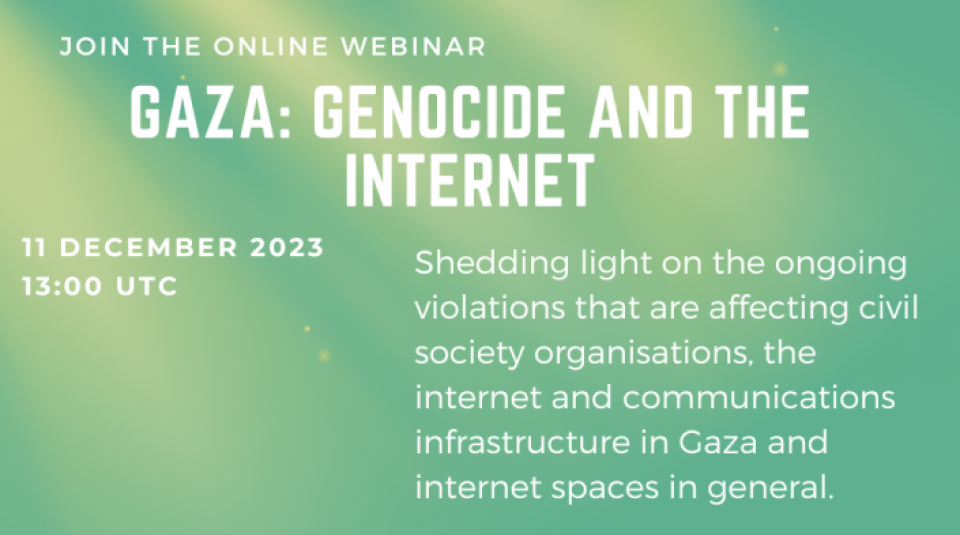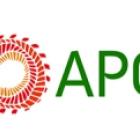
apc.org
This article was originally published on apc.org on December 19, 2023, here.
On 11 December 2023, 7amleh, SMEX and APC hosted a webinar to commemorate Human Rights Day and to shed light on the ongoing violations that are affecting civil society organisations, the internet and communications infrastructure in Gaza and internet spaces in general. The day marked both the 75th Anniversary of the Universal Declaration of Human Rights (UDHR) as well as a Palestinian call for a global strike to demand a ceasefire in Gaza.
Executive director of SMEX Mohamad Najem moderated the discussion that included Nadim Nashif, founder and executive director of 7amleh, the Arab Center for the Advancement of Social Media; Marwa Fatafta, MENA policy and advocacy director at Access Now; Haneen Kinani, advocacy officer at the The Palestine Institute for Public Diplomacy (PIPD); and Ahmad AlSadeh from ISOC Palestine.
The conversation highlighted issues of the destruction of communications infrastructure, content moderation and hate speech, internet shutdowns and Big Tech problems that have surfaced in light of the ongoing genocide, in order to collectively think about solidarity actions to protect human rights in Gaza and around the world.
Misinformation for occupation and controlling narratives
Kinani from PIPD began the discussion by asking the questions, “What does it mean for Palestinians to be silenced?” and “When was the first time we realised we were an occupied people?” She said that violent misinformation campaigns during the current war – such as the debunked narrative about beheaded babies – is intended to smear Palestinians as subhumans and animals and thus deserving of aggressions. The war has been rife with mass propagation of misinformation and hate speech to dehumanize victims and justify war crimes, accompanied with high levels of censorship and surveillance of Palestinian voices.
Kinani stated that this is a well-known tactic in the Israeli playbook as part of its genocide and apartheid policy. “This is a diversion of a harsher Israeli crime – the status quo of Israeli apartheid that is violent and patriarchal. They don’t justify their sexual violence – they divert attention from it by justifying the crimes.” She continued that there has always been an escalation of Israeli repression when Palestinians have challenged the Zionist status quo, most recently during the 2021 Unity Intifada that was able to include people from outside like Jordanians through the use of digital spaces. “Israel has externalised colonial tactics globally, including in online spaces, to silence and delegitimise Palestinian voices who criticise its apartheid regime,” she said.
Nashif from 7amleh agreed that there has been wide and ongoing silencing of Palestinian narrative on various levels, including trying to harm civil society organisations. From October, he said, it felt like some governments had clear positions against Palestine and there seemed a clear decision inside social media companies to have one mainstream narrative, as shown by documents leaked from Meta and published by the Wall Street Journal. He also mentioned advertising on social platforms as “another battlefield” due to which “European and American citizens see a lot of propaganda videos.” Thus, he pointed out, mainstream media, social media and advertising control the narrative in the West.
Nashif also emphasised how social media platforms' touted content moderation policies have failed by over-moderating Palestinian and Arabic content while there has been little to none of Hebrew content. “We have developed mechanisms to detect these phenomena,” he added. “We have now recorded over 2.1 million inciting posts in Hebrew across social platforms, but nobody is dealing with this. Nobody is policing this. There is doxing, calls for rape and killing, attacking the homes of Palestinians.” He also made the point about how civil society organisations have also been targeted for many years with smear campaigns so that they don’t get resources or staff.
Infrastructure control, destruction and shutdowns
Fatafta from Access Now provided some context of how Israel’s digital occupation of online spaces has been going on since its occupation of Palestinian territories. “Over the last 30 years,” she said, “Palestinians have been completely dependent on Israel for their internet access.” She spoke about how all internet cables that connect Palestine go through Israel and Palestinian mobile operators have been able to provide only 2G networks.
AlSadeh from ISOC Palestine agreed, saying, “Will we always have Israeli control over Palestinian infrastructure of internet and telecom? The Israeli side controls the internet and all telecom lives and uses it as a weapon, similar to how they control borders… They have complete control of telecom agreements. Palestinian providers are like subcontractors of Israeli companies with no way to exit and access international routes except through the Israeli side. The data centres are outside Palestinian control as well.”
Fatafta pointed to how Israel has always targeted internet infrastructure in its offensives. This time, alongside not allowing fuel, water or medicines, she said that it has bombarded Palestinian cell towers, fiber cables, ISP offices and data centres. “Palestinians have learnt to rely on solar panels, emergency supplies and batteries, but they finally ran out on November 16th,” she said.
Several speakers also discussed the role of internet shutdowns in the war. Fatafta said, “Why are internet shutdowns disproportionate under international law? We see internet shutdowns as a weapon of war like in Ukraine and Myanmar. Gaza is unique because of Israel’s siege on fuel and its control of infrastructure. ITU, WHO, UNICEF and Doctors without Borders have highlighted how internet shutdowns have made humanitarian support impossible. Israel’s Ministry of Communications has not been shy about saying they’re considering shutting down the internet.”
Meanwhile, alternatives like satellite internet have also not been allowed to be installed. AlSadeh from ISOC added, “Since Israel now considers this a war zone, the decision to shut down the internet is with military powers. Israel uses internet shutdowns as a military tactic and for monitoring.” He also pointed to how the Internet Society has had a strong position for countries like Ukraine but not Palestine. “Their stance is not as strong as desired or expected, although as the Palestine chapter we’ve called for them to issue a clear position towards internet shutdowns in Gaza,” he said. Finally, he also pointed to the need for political will more than technical solutions for internet blackouts, such as for the option of getting coverage via Egypt.
Big Tech’s power and complicity
Nashif from 7amleh said that it is important to consider the power of social media platforms – how they treat Ukraine in comparison to Palestine, Myanmar, Ethiopia and India reflects power equations and these companies’ values. “We see it now clearly in Palestine, but these biases affect places around the globe, especially in the Global South,” he said.
Fatafta also reminded everyone that in Ukraine, social media companies have gone above and beyond to recognise that Ukraine has been invaded, enable access to information and taken proactive measures like delisting neo-Nazi groups. Such exceptions are not made for Palestine. “There has been weaponisation of these platforms through Israeli agencies," she stated. "There is focus on disinformation such as how Hamas is using hospitals and ambulances… What are Meta and other companies doing now to ensure their platforms not being used for genocide?”
How can we hold these companies accountable? Nashif emphasised that this moment has revealed the need to revise civil society’s approach to these companies. “We have invested time in soft diplomacy, internal lobbies and meetings, and to be honest they have done nothing much,” he said. “We need to choose more aggressive approaches. We can’t have anger management sessions – for Meta to manage activists’ anger. There are avenues like courts, shareholders, UN mechanisms, boycotts, reputational damage – we have to think of more proactive and aggressive steps. We don’t want to spend the coming years just conducting meetings that go nowhere. And often the executives don’t have the authority anyways to create change. These companies won’t change if they don’t realise there is a heavy price for their conduct.”
The discussion concluded with thoughts on potential next steps. The speakers agreed that it is crucial to keep creating spaces for Palestinian voices to be heard, to express themselves, and to continue conversation with civil society and other actors. It is also important is to keep documenting violations and ways in which Palestinian voices are being censored and silenced.
More than anything, the speakers were unanimous that is important to continue these conversation and help share voices from Palestine. “We shouldn’t stop talking about this situation,” said Kinani. “We fear that this will also be normalised. We need to put pressure on companies and governments.”
Fatafta reminded the audience that “everyone’s voice counts. Don’t feel you don’t know enough. It is a myth that the issue is too complicated. On this 75th anniversary of the Universal Declaration of Human Rights, this attack on human rights and rules has brought all such frameworks into question. If we let Israel get away with these crimes, it casts a huge shadow on these frameworks. No one is free till everyone is free. Syrians are under Russian attacks. It’s the same in Ukraine. Impunity has consequences.”
At one point, Kinani pointed to some hope that “now the narrative is shifting a little towards Israeli apartheid and its policy of going on offence against Palestinian civil society.” A campaign calling on Meta to “stop its systemic censorship of Palestinian voices” was also shared.
Cynthia El Khoury from APC thanked the speakers for helping to commemorate Human Rights Day and ended with the hope that 2024 will bring better news.
- 47 views







Add new comment